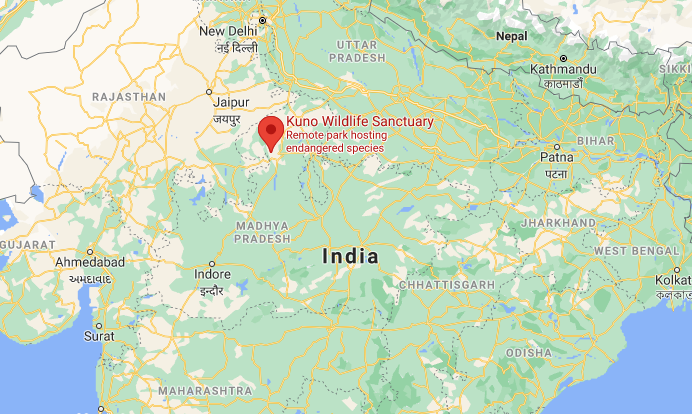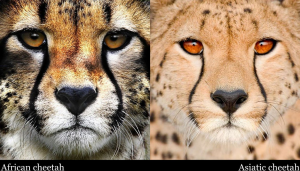Eight cheetahs to be translocated from Africa to MP’s Kuno National Park
About Kuno National Park

- It is located in Madhya Pradesh. Earlier it was a wildlife sanctuary but in 2018 it was given national park status.
- The Kuno river flows through the national park.
- Bio-Geographically this area falls under the Kathiawar-Gir dry deciduous forest ecoregion and the forest types found in this area include the Northern tropical dry deciduous forest, Southern tropical dry deciduous forest, Dry Savannah forest & grassland and Tropical riverine forest.
- In the 1990s, it was selected as a possible site to implement the Asiatic Lion Reintroduction Project, which aimed at establishing a second lion population in India after Gir National Park, Gujarat.
Cheetahs
- They are known as the fastest mammal on land, which can reach speeds of 60 or perhaps even 70 miles (97 or 113 kilometers) an hour over short distances. They have excellent eyesight to spot prey in the tall grasslands.
- Cheetahs eat small- to medium-size animals, such as hares, impalas, wildebeest calves, and gazelles.
- Female cheetahs typically have a litter of three cubs and live with them for one and a half to two years.
- There are 2 sub-species among cheetahs.

| African Cheetah | Asian Cheetah |
| Bigger build with sturdier legs and necks. | Slightly smaller and slender than African one. |
| Thicker fur distributed evenly | It has more fur on the body, especially under the belly and the back of the neck. |
| About 10,000 of them are left in the African wild at the moment. | Only about 50-100 of them are left in the wild. |
| IUCN status: Vulnerable | IUCN status: Critically Endangered |
Cheetah Reintroduction Program
- India had lost its cheetah population in the 1950s due to extensive hunting and poaching. In 1952, the cheetah was officially declared extinct from India.
- Cheetah Reintroduction project is a plan to bring African or Asian Cheetahs from other countries, introduce them to suitable habitats in India and revive cheetah’s population.
- The central government’s initiative to reintroduce the cheetah, the only large mammal to become extinct after India’s Independence, was approved by the Supreme Court in 2020.
- Responding to a petition filed by the National Tiger Conservation Authority (NTCA), the court said that the African cheetah can be reintroduced on “an experimental basis in a carefully chosen habitat and nurtured and watched to see whether it can adapt to the Indian conditions.
- The Supreme Court has also formed a 3 member committee to look after the cheetah reintroduction program and guide the National Tiger Conservation Authority in translocation of the African cheetah from South Africa and Namibia to India.
Why in the news?
- Madhya Pradesh’s Kuno National Park is all set to receive 8-10 cheetahs from Namibia through donation from Endangered Wildlife Trust (EWT) of South Africa.
- Finding Kuno National Park suitable for cheetahs, EWT specialists have asked to fence the national park ensuring cheetahs’ safety.
- The cheetahs will be introduced in November 2021.
References:
- https://theprint.in/environment/african-experts-to-come-calling-as-india-prepares-ground-for-cheetah-reintroduction/630252/
- https://kids.nationalgeographic.com/animals/mammals/facts/cheetah
- https://www.worldatlas.com/articles/what-are-the-differences-between-asiatic-cheetahs-and-african-cheetahs.html
- https://www.deviantart.com/legend-tony980/art/African-and-Asiatic-cheetah-502237436
- https://www.nationalgeographic.com/animals/mammals/facts/cheetah
- https://www.hindustantimes.com/cities/bhopal-news/eight-cheetahs-to-be-translocated-from-africa-to-mp-s-kuno-national-park-101621622571494.html
Subscribe
Login
0 Comments
